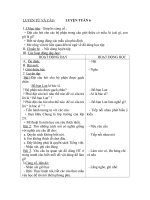LUYỆN từ VỰNG TIẾNG ANH 18 how to check your standing as an amateur etymologist
Bạn đang xem bản rút gọn của tài liệu. Xem và tải ngay bản đầy đủ của tài liệu tại đây (229.5 KB, 38 trang )
18
HOW TO CHECK YOUR STANDING AS AN
AMATEUR ETYMOLOGIST
(Answers to Teaser Questions in Chapters 3–7,
9–12, and 14–16)
CHAPTER 3:
1. Anthropocentric (an′-thrƏ-pƏ-SEN′-trik), an adjective built on
anthropos, mankind; Greek kentron, center, and the adjective su x ic, describes thinking, assumptions, reasoning, etc. that see mankind
as the central fact, or ultimate aim, of the universe. The noun forms
are
either
anthropocentrism
(an′-thrƏ-pƏ-SEN′-triz-Əm)
or
anthropocentricity (an′-thrƏ-pō′-sƏn-TRIS′-Ə-tee).
2. Andromania (an′-drƏ-MAY′-nee-Ə), a combination of andros,
man (male), plus mania, madness, signi es an obsession with males.
Person: andromaniac, one who is mad about men; adjective:
andromaniacal (an′-drƏ-mƏ-NĪ′-Ə-kƏl).
3. Gynandrous (jī-NAN′-drƏs), combining gyne, woman, with
andros, man (male), describes:
a. plants in which the male and female organs are united in the
same column; or
b. people who physically have both male and female sexual
organs, often one or both in rudimentary form; or
c. (a more recent meaning) people who exhibit, or are willing to
own up to, the male and female emotional characteristics that
everyone possesses.
The word may have the roots in reverse, becoming androgynous
(an-DROJ′-Ə-nƏs), with all three meanings identical to those of
gynandrous.
Hermaphroditic (hur-maf′-rƏ-DIT′-ik), a combination of Hermes, the
Greek god who served as messenger or herald (in Roman
mythology, this god was known as Mercury, and is conventionally
pictured with wings on his heels), and Aphrodite, the Greek goddess
of love and beauty (in Roman mythology, Venus), has either of the
rst two meanings of gynandrous.
The noun form of gynandrous is gynandry (jī-NAN′-dree); of
androgynous, androgyny (an-DROJ′-Ə-nee); of hermaphroditic,
hermaphroditism (hur-MAF′-rƏ-dī′-tiz-Əm).
The individual plant is an andrognye (AN′-drƏ-jin); plant or
person, a hermaphrodite (hur-MAF′-rƏ-dīt′).
4. Monomania (mon-Ə-MAY′-nee-Ə), combining monos, one, and
mania, madness, is an obsession with one thing, or obsessiveness in
one area. Person: monomaniac; adjective: monomaniacal (mon′-Ə-mƏNĪ′-Ə-kƏl).
5. A misandrist (mis-AN′-drist), combining misein, to hate, with
andros, man (male), hates men. Noun: misandry (mis-AN′-dree).
Adjective: misandrous (mis-AN′-drƏs).
Check your learning
ROOT
1. anthropos
MEANING
_________________
EXAMPLE anthropocentric
2. kentron
_________________
EXAMPLE anthropocentrism
3. andros
_________________
EXAMPLE andromania
4. mania
_________________
EXAMPLE andromaniac
5. gyne
_________________
EXAMPLE gynandrous
6. Hermes
_________________
EXAMPLE hermaphrodite
7. Aphrodite
_________________
EXAMPLE hermaphroditic
8. monos
_________________
EXAMPLE monomania
9. misein
EXAMPLE misandry
_________________
KEY: 1–mankind, 2–center, 3–man (male), 4–madness, 5–woman,
6–Hermes, the messenger of the gods, 7–Aphrodite, goddess
of love and beauty, 8–one, 9–to hate
CHAPTER 4:
1. Pedodontia (pee-dƏ-DON′-shƏ) is the specialty of child dentistry
—paidos, child, plus odontos, tooth. Specialist: pedodontist. Adjective:
pedodontic.
2. Cardialgia (kahr′-dee-AL′-jƏ), heart pain—kardia, heart, plus
algos, pain.
3. Odontalgia (ō′-don-TAL′-jƏ), toothache.
4. Nostalgia (nos-TAL′-jƏ). Adjective: nostalgic.
Check your learning
PREFIX, ROOT
1. padios (ped-)
MEANING
_________________
EXAMPLE pedodontia
2. kardia
_________________
EXAMPLE cardialgia
3. algos
_________________
EXAMPLE odontalgia
4. odontos
EXAMPLE pedodontist
_________________
5. nostos
EXAMPLE nostalgia
_________________
KEY: 1–child, 2–heart, 3–pain, 4–tooth, 5–a return
CHAPTER 5:
1. Eighty to eighty-nine years old. From Latin octoginta, eighty.
People of other ages are as follows:
(a) 50–59: quinquagenarian (kwin′-kwƏ-jƏ-NAIR′-ee-Ən)
(b) 60–69: sexagenarian (seks′-Ə-jƏ-NAIR′-ee-Ən)
(c) 70–79: septuagenarian (sep′-ch -Ə-jƏ-NAIR′-ee-Ən)
(d) 90–99: nonagenarian (non′-Ə-jƏ-NAIR′-ee-Ən)
(e) 100 and over: centenarian (sen′-te-NAIR′-ee-Ən)
2. Cacophony (kƏ-KOF′-Ə-nee). Adjective: cacophonous (kƏ-KOF′-ƏnƏs).
3. Cacopygian (kak′-Ə-PIJ′-ee-Ən).
4. Telescope (tele- plus skopein, to view) or telebinoculars; telephone;
television.
Check your learning
PREFIX, ROOT
1. octoginta
MEANING
_________________
EXAMPLE octogenarian
2. quinquaginta
_________________
EXAMPLE quinquagenarian
3. sexaginta
EXAMPLE sexagenarian
_________________
4. septuaginta
_________________
EXAMPLE septuagenarian
5. nonaginta
_________________
EXAMPLE nonagenarian
6. centum
_________________
EXAMPLE centenarian
7. kakos
_________________
EXAMPLE cacophony
8. phone
_________________
EXAMPLE cacophonous
9. pyge
_________________
EXAMPLE cacopygian
10. tele-
_________________
EXAMPLE television
11. skopein
EXAMPLE telescope
_________________
KEY: 1–eighty, 2– fty, 3–sixty, 4–seventy, 5–ninety, 6–one
hundred, 7–ugly, harsh, bad, 8–sound, 9–buttock, 10–
distance, from afar, 11–to view
CHAPTER 6:
1. Sophomore; from sophos plus moros, foolish, the word
etymologically designates one who is half wise and half foolish. The
adjective sophomoric (sof-Ə-MAWR′-ik) describes people, attitudes,
statements, writings, etc. that are highly opinionated, self-assured,
and coming o as if wise, but which in reality are immature,
inexperienced, foolish, etc.
2. Sophisticated (sƏ-FIS′-tƏ-kay′-tƏd). The verb is sophisticate, the
noun sophistication. One who is worldly-wise is a sophisticate (sƏ-FIS′tƏ-kƏt).
Sophisticated has in recent years taken on the added meaning of
highly developed, mature, or complicated; appealing to a mature
intellect; or aware and knowledgeable. Examples: sophisticated
machinery, electronic equipment; a sophisticated approach; a
sophisticated audience, group, sta , faculty, etc.
3. One who is obsessed with books, especially with collecting
books.
4. (a) speaking one language, (b) speaking two languages, (c)
speaking three languages.
Multilingual (multus, many, plus lingua)—speaking many
languages.
A linguist is one who is uent in many languages, or else an expert
in linguistics (or both).
Multus, as indicated, means many, as in multitude, multiply,
multiple, multicolored, multifarious, multilateral, etc., etc.
5. (a) France, (b) Russia, (c) Spain, (d) Germany,
China.
6. (a) androphile, (b) gynephile (or philogynist), (c)
zoophile, (e) botanophile.
But pedophilia (pee′-dƏ-FIL′-ee-Ə) is another story.
sexually molests young children—such love little
without!
(e) Japan, (f)
pedophile, (d)
A pedophiliac
kids can do
Check your learning
PREFIX, ROOT
1. sophos
MEANING
_________________
EXAMPLE sophomore
2. moros
_________________
EXAMPLE sophomoric
3. biblion
_________________
EXAMPLE bibliomaniac
4. mania
_________________
EXAMPLE bibliomania
5. lingua
_________________
EXAMPLE linguist
6. monos
_________________
EXAMPLE monolingual
7. bi-
_________________
EXAMPLE bilingual
8. tri-
_________________
EXAMPLE trilingual
9. multus
_________________
EXAMPLE multilingual
10. Franco-
_________________
EXAMPLE Francophile
11. Russo-
_________________
EXAMPLE Russophile
12. Hispano-
_________________
EXAMPLE Hispanophile
13. Germano-
_________________
EXAMPLE Germanophile
14. Nippono-
_________________
EXAMPLE Nipponophile
15. Sino-
_________________
EXAMPLE Sinophile
16. andros
_________________
EXAMPLE androphile
17. gyne
_________________
EXAMPLE gynephile
18. philein
_________________
EXAMPLE philogynist
19. paidos (ped-)
EXAMPLE pedophile
_________________
20. zoion
_________________
EXAMPLE zoophile
21. botane
EXAMPLE botanophile
_________________
KEY: 1–wise, 2–foolish, 3–book, 4–madness, 5–tongue, 6–one, 7–
two, 8–three, 9–many, 10–France, 11–Russia, 12–Spain, 13–
Germany, 14–Japan, 15–China, 16–man (male), 17–woman,
18–to love, 19–child, 20–animal, 21–plant
CHAPTER 7:
1. A notable is someone well-known.
2. To notify is, etymologically, to make known—notus + -fy, a
derivation of facio, to make.
Notice, as a noun, is what makes something known; to notice, as a
verb, is to observe (something or someone) so that it, he, or she
becomes known to the observer.
-Fy, as a verb su x, means to make. So simplify is to make simple,
clarify, to make clear; liquefy, to make liquid; putrefy, to make (or
become) rotten or putrid; stupefy, to make stupid, or dumb, with
astonishment (note the -e preceding the su x in liquefy, putrefy,
stupefy); fortify, to make strong; rectify, to make right or correct; etc.,
etc.
3. Chronograph (KRON′-Ə-graf′) is an instrument that measures
and records short intervals of time.
4. To generate is to give birth to, guratively, or to create or
produce, as a turbine generates power, a person’s presence generates
fear, etc. The noun is generation, which, in another context, also
designates the people born and living about the same time (the
older, previous, or next generation, the Depression generation, etc.),
or a period, conventionally set at about thirty years, between such
groups of people.
To regenerate is to give birth to again, or to be born again. Some
creatures can regenerate new limbs or parts if these are lost or cut o
—or the limbs or parts regenerate.
Re- means, of course, again; or, in some words, as recede, regress,
etc., back.
5. Omnipotent (om-NIP′-Ə-tƏnt)—all-powerful; omnis plus potens,
potentis, powerful.
Omnipresent (om′-nƏ-PREZ′-Ənt)—present all over, or everywhere.
Nouns: omnipotence, omnipresence.
6. Anaphrodisiac (Ən-af′-rƏ-DIZ′-ee-ak′)—both a noun and an
adjective. Saltpeter is supposedly an anaphrodisiac; so, some people
say, is a cold shower, which is highly doubtful. The best temporary
anaphrodisiac is probably sexual intercourse. Some women who
were teen-agers when Elvis Presley was at the height of his
popularity have told me that the young man’s gyrating hips were
aphrodisiacal—I will take their word for it, as Elvis has never turned
me on. On the other hand, if you want to talk about Diane Keaton or
Raquel Welch … or especially Marilyn Monroe…
Check your learning
PREFIX, ROOT
1. notus
MEANING
_________________
EXAMPLE notify
2. chronos
_________________
EXAMPLE chronograph
3. graphein
_________________
EXAMPLE chronographic
4. genesis
_________________
EXAMPLE generate
5. reEXAMPLE regenerate
_________________
6. omnis
_________________
EXAMPLE omnipotent
7. potens, potentis
_________________
EXAMPLE omnipotence
8. anEXAMPLE anaphrodisiac
_________________
KEY: 1–known, 2–time, 3–to write, 4–birth, 5–again, 6–all, 7–
powerful, 8–not (negative)
CHAPTER 9:
1. Magnanimity (mag′-nƏ-NIM′-Ə-tee). Adjective: magnanimous
(mag-NAN′-Ə-mƏs).
2. Bilateral (bī-LAT′-Ər-Əl), as in a bilateral decision, i.e., one made
by the two sides or two people involved. On the other hand, a
unilateral (y -nƏ-LAT′-Ər-Əl) decision is made by one person,
without consultation with others.
3. Transcribe. Noun: transcription. A stenographer transcribes
shorthand notes into English words, or a musical transcriber arranges
or adapts a musical composition for an instrument, group, etc. other
than the one for which the work was originally written.
4. Malaria was once thought to have been caused by the “bad air”
of swamps; actually, it was (and is) transmitted to humans by
infected anopheles mosquitoes breeding and living in swamps and
other places where there is stagnant water.
5. Confection. The word is hardly used much today with this
meaning, except perhaps by members of an older generation who
remember confectioner’s shops and confectionery stores. Now such
places are called ice cream stores (or ice cream parlors) and are run, at
least on the west coast, by Baskin-Robbins or Farrell’s; or they are
called candy shops; or, when I was growing up, candy stores, where
the kids all hung out, and candies could be bought for a penny
apiece, with Hershey bars selling for a nickel (that’s why they are
called “the good old days”).
Check your learning
PREFIX, ROOT
1. magnus
MEANING
_________________
EXAMPLE magnanimous
2. animus
_________________
EXAMPLE magnanimity
3. bi-
_________________
EXAMPLE bilateral
4. unus
_________________
EXAMPLE unilateral
5. latus, lateris
_________________
EXAMPLE unilateral
6. trans-
_________________
EXAMPLE transcribe
7. scribo, scriptus
_________________
EXAMPLE transcription
8. malus
_________________
EXAMPLE malaria
9. con-
_________________
EXAMPLE confection
10. facio (fec-)
EXAMPLE confectionery
_________________
KEY: 1–big, large, great, 2–mind, 3–two, 4–one, 5–side, 6–across,
7–to write, 8–bad, evil, 9–together, 10–to make
CHAPTER 10:
1. Modus operandi. Method (or mode) of working (or operating).
Pronounced MŌ′-dƏs op′-Ə-RAN′-dī, the word is not, of course,
restricted to the special methods used by a criminal, but may refer
to the method or style of operating characteristic of any other
professional. Modus vivendi (MŌ′dƏs vƏ-VEN′-dī), etymologically
“method of living,” is the style of life characteristic of a person or
group.
2. Circumscription. To circumscribe also means, guratively, to
write (a line) around (one’s freedom of action), so that one is
restricted, limited, hemmed in, as in, “a life circumscribed by
poverty, by parental injunctions, or by an overactive conscience,
etc.,” or “actions circumscribed by legal restraints.” The noun
circumscription has the gurative meaning also.
3. Somniloquent (sƏm-NIL′-Ə-kwƏnt). Noun: somniloquence (sƏmNIL′-Ə-kwƏns) or somniloquy (sƏm-NIL′-Ə-kwee), the latter noun also
designating the words spoken by the sleeper. One who habitually
talks while asleep is a somniloquist (sƏm-NIL′-Ə-kwist).
4. An aurist is an ear specialist, more commonly called an otologist
(ō-TOL′-Ə-jist), from Greek otos, ear. Noun: otology. Adjective:
otological (ō-tƏ-LOJ′-Ə-kƏl).
It is di cult at this point to resist telling a well-known story
about medical specialists. In fact it’s impossible to resist, so here it
is:
A dentist, doing his
rst extraction on a patient, was
understandably nervous. When he got the molar out, his hand
shook, he lost his grip on the instrument, and the tooth dropped
down into the patient’s throat.
“Sorry,” said the doctor. “You’re outside my specialty now. You
should see a laryngologist! [lair′-ing-GOL′-Ə-jist—a larynx or throat
specialist].”
By the time the unfortunate victim got to the laryngologist, the
tooth had worked its way much further down.
The laryngologist examined the man.
“Sorry,” said the doctor, “You’re outside my specialty now. You
should see a gastrologist! [gas-TROL′-Ə-jist—a stomach specialist].”
The gastrologist X-rayed the patient. “Sorry,” said the doctor, “the
tooth has traveled into your lower intestines. You should see an
enterologist! [en′-tƏ-ROL′-Ə-jist—an intestinal specialist].”
The enterologist took some X rays. “Sorry, the tooth isn’t there. It
must have gone down farther. You should see a proctologist! [prokTOL′-Ə-jist—a specialist in diseases of the rectum; from Greek
proktos, anus].”
Our patient is now on the proctologist’s examining table, in the
proper elbow-knee position. The doctor has inserted a proctoscope
and is looking through it.
“Good heavens, man! You’ve got a tooth up there! You should see
a dentist!”
5. Aural (AWR-Əl) refers to the ears or to the sense or
phenomenon of hearing. Monaural reproduction, as of music over a
radio or by a phonograph record, for example, has only one source
of sound, and technically should be called monophonic (mon′-ƏFON′-ik)—monos, one, plus phone, sound. Binaural may mean having
two ears or involving the use of both ears, or, recently, descriptive of
sound from two sources, giving a stereophonic (steer′-ee-Ə-FON′-ik)
e ect—stereos, deep, solid, plus phone.
6. A noctambulist (nok-TAM′-byƏ-list) walks at night—nox, noctis,
night, plus ambulo, to walk. Noun: noctambulism (nok-TAM′-byƏ-lizƏm).
7. Somni c (som-NIF′-ik): a somni c lecture, movie, e ect, etc.
8. Circumambulate (sur′-kƏm-AM′-byƏ-layt′). To circumnavigate is
to sail around—circum, around, plus navis, ship.
Check your learning
PREFIX, ROOT
1. modus
EXAMPLE modus
_________________
operandi
2. operandi
EXAMPLE modus
_________________
operandi
3. vivo
EXAMPLE modus
MEANING
_________________
vivendi
4. circum-
_________________
EXAMPLE circumscribe
5. scribo, scriptus
_________________
EXAMPLE circumscription
6. somnus
_________________
EXAMPLE somniloquent
7. loquor
_________________
EXAMPLE somniloquence
8. aurus
_________________
EXAMPLE aurist
9. otos
EXAMPLE otology
_________________
10. proktos
_________________
EXAMPLE proctologist
11. stereos
_________________
EXAMPLE stereophonic
12. phone
_________________
EXAMPLE stereophonic
13. monos
_________________
EXAMPLE monaural
14. bi-
_________________
EXAMPLE binaural
15. nox, noctis
_________________
EXAMPLE noctambulist
16. ambulo
_________________
EXAMPLE noctambulism
17. facio ( c-)
EXAMPLE somni
_________________
c
KEY: 1–mode, method, 2–of working, 3–to live, 4–around, 5–to
write, 6–sleep, 7–to speak, to talk, 8–ear, 9–ear, 10–anus, 11–
deep, solid, 12–sound, 13–one, 14–two, 15–night, 16–to walk,
17–to make
CHAPTER 11:
1. Matronymic (mat′-rƏ-NIM′-ik). Or, if you prefer to use the Greek
root for mother (meter, metr-), metronymic. The Greek word metra,
uterus, derives from meter, naturally enough, so metritis is
in ammation of the uterus; metralgia is uterine pain; endometriosis
(en′-dō-mee′-tree-Ō′-sis) is any abnormal condition of the uterine
lining—endo, inside; metra, uterus; -osis, abnormal condition.
2. (a) An incendiary statement, remark, speech, etc. guratively
en ames an audience, sets them a re, gets them excited,
galvanizes them into action, etc.
(b) Incense (IN′-sens) is a substance that sends o a pleasant
odor when burned—often, but not necessarily, to mask
unpleasant or telltale smells, as of marijuana smoke, etc.
(c) To incense (in-SENS′) is to anger greatly, i.e., to “burn up.”
“I’m all burned up” is etymologically an accurate translation
of “I’m incensed.”
3. (a) Ardent (AHR′-dƏnt)—burning with zeal, ambition, love, etc.,
as an ardent suitor, worker, etc.
(b) Ardor (AHR′-dƏr)—the noun form of ardent—burning
passion, zeal, enthusiasm, etc. Alternate noun: ardency
(AHR′-dƏn-see).
4. Megaphone.
5. Megalopolis (meg′-Ə-LOP′-Ə-lis).
6. Police. Politics.
7. Bibliokleptomaniac (bib′-lee-ō-klep′-tƏ-MAY′-nee-ak): one who
has an obsession for stealing books. Not too many years ago, an
author titled his book, Steal This Book!, perhaps hoping to appeal to
bibliokleptomaniacs; if the appeal was successful enough, his royalty
statements must have been minuscule indeed!
Gynekleptomaniac.
Pedokleptomaniac.
Androkleptomaniac.
Demokleptomaniac.
If you prefer to use shorter words, compulsive kidnapper or
obsessive abductor will do as well for these words.
8. Acromaniac.
Agoramaniac.
Claustromaniac.
9. Kleptophobe; pyrophobe; gynephobe; androphobe; demophobe.
Triskaidekaphobia (tris′-kī-dek′-Ə-FŌ′-bee-Ə) is the morbid dread of
the number 13, from Greek triskai, three, deka, ten, and phobia.
10. Gnosiology (nō′-see-OL′-Ə-jee), the science or study of
knowledge.
11. Amadeus is love (Latin amor) God (Latin deus). Theophilus is
love (Greek philos) God (Greek theos). Gottlieb is love (German Lieb)
God (German Gott).
Perhaps this explains why he started composing at the age of four
and wrote forty-one symphonies.
12. Cellophane—cellulose made to be transparent, i.e., to show
what’s wrapped in it.
13. Hypoglycemia (hī-pō-glī-SEE′-mee-Ə)—low blood sugar, a
common ailment today, though I believe the AMA has called it a
“non-disease” (Greek hypos, under; glykys, sweet; haima, blood).
Haima, blood, is found in many English words, the root spelled
either hem- or -em. Here are a few, with their etymological
interpretations:
(a) Hemorrhage—excessive blood ow.
(b) Anemia—“no blood”—actually a pathological reduction of
red blood corpuscles.
(c) Hematology—science of blood (and its diseases).
(d) Hemophilia—“love of blood”—actually a hereditary
condition, occurring in males, in which the blood clots too
slowly.
(e) Hemoglobin—“blood gobules”—actually the red coloring
matter of the red blood corpuscles.
Hyperglycemia is the opposite of hypoglycemia.
14. (a) Pantheon (PAN′-thee-on′)—a temple built in Rome in 27
B.C. for “all the gods.”
(b) Pandemonium (pan′-dƏ-MŌ′-nee-Əm)—a word supposedly
coined by poet John Milton in Paradise Lost to signify the
dwelling place of all the demons; now any wild and noisy
disorder.
(c) Panorama (pan′-Ə-RAM′-Ə or pan′-Ə-RAH′-mƏ)—a view (or
a picture of such a view) all around—pan, all, plus horama,
view. The adjective: panoramic (pan′-Ə-RAM′-ik).
15. Monarchy—rule by one person.
Check your learning
PREFIX, ROOT
1. mater, matris
MEANING
_________________
EXAMPLE matronymic
2. onyma
_________________
EXAMPLE metronymic
3. meter
_________________
EXAMPLE metronymic
4. metra
EXAMPLE metritis
_________________
5. endo-
_________________
EXAMPLE endometriosis
6. incendo, incensus
_________________
EXAMPLE incendiary
7. ardo
_________________
EXAMPLE ardent
8. megalo-
_________________
EXAMPLE megalopolis
9. polis
_________________
EXAMPLE police
10. demos
_________________
EXAMPLE demokleptomaniac
11. akros
_________________
EXAMPLE acromaniac
12. agora
_________________
EXAMPLE agoramaniac
13. claustrum
_________________
EXAMPLE claustromaniac
14. triskai
_________________
EXAMPLE triskaidekaphobia
15. deka
_________________
EXAMPLE triskaidekaphobia
16. gnosis
_________________
EXAMPLE gnosiology
17. amor
_________________
EXAMPLE Amadeus
18. deus
_________________
EXAMPLE deity
19. theos
_________________
EXAMPLE Theophilus
20. philos
_________________
EXAMPLE hemophilia
21. phanein
_________________
EXAMPLE cellophane
22. hypos
_________________
EXAMPLE hypoglycemia
23. glykys
_________________
EXAMPLE hypoglycemia
24. haima
_________________
EXAMPLE hemorrhage
25. an-
_________________
EXAMPLE anemia
26. hyper-
_________________
EXAMPLE hyperglycemia
27. pan
EXAMPLE Pantheon
_________________






